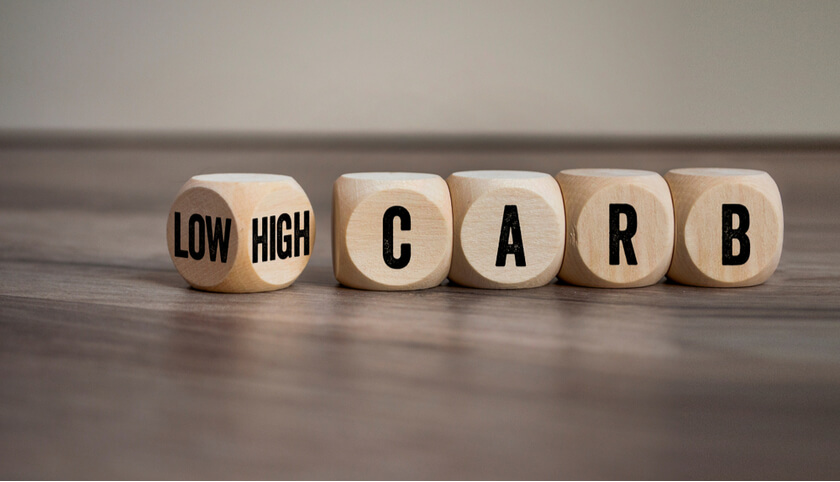Net Carbs vs. Total Carbs: What is the Difference?

Are you trying to navigate a low-carb diet?
If you’re beginning the ketogenic diet, chances are you’ll have heard carbs discussed repeatedly.
A low-carb diet is a primary factor in reaching success with ketosis. You’ll hear net carbs and total carbs used significantly on your journey, among other terms. But if you’re wondering what it means, you’re not alone.
Newcomers need to understand carbohydrate intake to maintain a tailored diet successfully.
Reducing your carb intake can be challenging, but you can get the hang of the keto diet once you’re familiar with the different terminology.
We explore the difference between net and total carbs to keep you on the right track. You can then decide what to limit, avoid, and look out for on the nutrition label when grocery shopping.
Difference Between Carbs and Net Carbs
Carbohydrates are a kind of macronutrient, like fat and protein, found in certain food sources and beverages.
When you consume carbs, the digestive system breaks them down into glucose, which your body then converts into energy for fuel.
Your carbohydrate intake can impact blood sugar. Too many carbs can cause high blood sugar, putting you at risk of diabetes. So, it’s best not to overconsume carbohydrates in your diet.
Carb counting is an integral part of the keto diet and other low-carb diets. If you’re new to it, differentiating between the carbs that matter can get tricky.
You’ve probably heard net carbs and total carbs referenced frequently. But what does it mean? Do you need to count both?
Net carbs and total carbs are not the same thing. You need to know the difference to succeed with your low-carb diet plan, as counting carbs is crucial to tracking your food and calorie intake.
To simplify it, let’s summarize the key difference between total and net carbs.

Advertisement
What Are Net Carbs?
Net carbs, sometimes called impact carbs, are carbohydrates that the human body can digest into glucose.
Net carbohydrates are the total number of carbs found in food minus fiber and sugar alcohols. The body does not digest fiber and sugar alcohols. They travel through the body unchanged. For this reason, net carbs subtract fiber from the overall carb count.
Sugar alcohols, also called polyols, are a form of carbohydrate. Certain sugar alcohols occur naturally in whole foods, while others are modified and used as low-carb artificial sweeteners in processed foods. The body does not fully absorb them.
As a result, these particular carbohydrates do not significantly impact blood sugar levels.
To calculate net carbs, simply minus the grams of fiber and sugar alcohols within the food’s total carbs.
You can make the calculations by reading food labels with the nutrition facts on the nutrition label of food products.
What Are Total Carbs?
Total carbs refer to the whole number of carbs found in the foods you eat.
It’s easy to remember if you think of total carbs as the total grams of carbohydrates, including starches, sugar, and grams of fiber.
There’s no subtraction or mathematical formula to be applied when assessing your total carb count.
How Many Net Carbs Are Allowed on Keto?
The ketogenic diet focuses on a restrictive low carb, high-fat diet.
In cutting down your carbohydrate intake, the body is deprived of glucose to fuel energy. Instead, your body targets stored fat as an alternative fuel source. And that’s ideal if you want to lose weight.
When this occurs, it is known as a metabolic state called ketosis.
Ultimately, nutritional ketosis helps you lose weight as your body burns excess fat. It can reduce blood sugar levels, insulin levels and boost energy.
You need to significantly reduce how many carbs you consume daily for keto success.
There are variations of the ketogenic diet, but all ban foods rich in carbohydrates.

There is no one-size-fits-all approach to keto. Your body is unique, and it is up to you to determine a safe carb intake for yourself. You can speak to nutrition experts about the diet to ensure you approach it safely.
A typical keto diet recommends limiting yourself to less than 50 grams of net carbs per day. Some suggest only 20 grams per day.
The daily calorie intake of most ketogenic diets is 70–80% fat, 10–20% protein, and only 5–10% carbohydrate.
Is Fiber a Carb?
Yes, fiber is a type of carb.
However, the difference with fiber is that it is a non-digestible carbohydrate. In other words, the body can’t digest it. Unlike other carbohydrates, fiber cannot break down into sugar molecules.
Dietary fiber has many benefits, including regulating bowel movements and improving digestive health.
We can categorize fiber into soluble and insoluble.
Soluble fiber dissolves in water and body fluids, creating a substance like a gel. It increases the good bacteria in the gut.
Insoluble fiber does not dissolve in liquid and is absorbed instead.
Dietary fiber carbs on keto
As mentioned previously, net carbs refer to total carbohydrates minus fiber. As the human body doesn’t digest fiber, it isn’t counted within your total carb intake.
Fiber can be tricky to navigate when controlling your diet to reach a state of ketosis.
Many high-fiber foods contain high levels of carbohydrates. But with several health benefits, you don’t want to completely cut fiber out of your diet. It’s best to find a balance.
Fortunately, many fiber-rich foods are also low in the carbs you want to avoid.
Always check food labels to confirm the nutritional content of the products you buy.
To achieve keto success, try the following foods which are considered keto-friendly.
- Avocado
- Artichokes
- Cruciferous vegetables including broccoli, cauliflower, Brussels sprouts, and kale
- Leafy greens
- Several nuts and seeds, including chia seeds, flaxseed, almonds, hazelnuts, and macadamia nuts

Should I Count Net Carbs or Total Carbs?
Whether you count net carbs or total carbs is entirely up to you, your preference, and your tolerance.
It also comes down to the goal you want to achieve, whether weight loss or managing health conditions.
Most keto followers count net carbs. Your net carb count only includes digestible carbohydrates, as these are the ones that will trigger a response to your insulin levels.
The non-digestible enzymes won’t sabotage your nutritional ketosis.
In some cases, net carbs can be misleading. Sometimes, the manufacturers of processed foods claim low net carbs in the food products. However, many often contain other ingredients and added sugar which the body does absorb.
To ensure you’re calculating net carbs correctly, try to stick to whole foods to avoid hidden carbs and sugars, or use an app to do this process for you.

A ketogenic diet app designed to make keto easy. From the start.
- Personalised meal plans & workouts
- 10,000 keto recipes + vegetarian-friendly recipe database
- Customizable grocery list
- Calorie tracker
- Keto education and overviews of current trends
How to Count Net Carbs
Counting net carbs is easy when you know how.
It requires the following formula:
Net carbohydrates equal total carbohydrates, minus fiber and sugar alcohols.
Sugar alcohols are present in packaged foods. With whole foods, you can simply subtract the fiber.
Food products have food labels. So, whatever food you’re eating, check out the total carb count and use the above formula. Everything you need to know should be stated within the nutrition facts.
If you follow a diet low in carbohydrates, you will soon become a whiz at reading food labels.
How Do Sugar Alcohols Affect Net Carbs?
Sugar alcohols are essentially sweeteners that imitate regular sugar. They taste similar but contain fewer calories and don’t impact blood sugar levels like sugar does.
As they are low in calories, they’re often found in sugar-free and diet food products, like gum, energy bars, and protein bars.

The most common types you will find listed within the ingredients of food labels are erythritol, maltitol, sorbitol, isomalt, and xylitol.
Reducing your sugar intake is a key feature of the keto diet. Sugar is known to raise blood sugar, which prevents you from reaching and maintaining ketosis.
Many keto dieters exclude certain sugar alcohols from foods to determine a net carb count, as most are only partially digested.
If counting sugar alcohols, you can minus half the grams of sugar alcohols from the total carb count to calculate net carbs.
It does depend, however, on the specific type contained in food. For instance, the human system is incapable of digesting erythritol. Any food containing erythritol can be subtracted entirely from the total carbs.
A Word From RD
Carbohydrates are present in lots of food sources.
It makes up one of the main macronutrients of our diets, converting into glucose for the body’s cells to fuel your body with energy.
Although part of a healthy diet, many people choose to cut down on carbs in a bid to lose weight, control blood sugar, or manage medical conditions.
Diets low in carbohydrates, like the ketogenic diet, are extremely popular. There are several health benefits recognized by nutrition experts that support the reduction of carbs for different health reasons.
The minute you start such a diet, you will find that counting and calculating carbs are essential. It is the only way to keep track of your calorie and carb intake as you restrict what you eat.
But as any new low-carb dieters will find, there is a little confusion regarding carbohydrates types. Net carbs and total carbs are two different things.
It’s vital to understand the difference between the two if you want to take complete control over your caloric intake.
Once you’re familiar, you will learn to read the nutrition label easily and calculate your carbohydrate intake correctly.
Remember that there is no set rule as to which carbs you should count. Your journey is personal, and you should make calculations based on your preferences and tolerance for carbs.
People process carbohydrates differently, and what works for somebody else may not work for you.
To be on the safe side, have a word with your doctor before significantly reducing your carb intake.
Overview of Net Carbs vs. Total Carbs
To sum up, total carbs are, as the name suggests – the total amount of carbs in a serving or meal. Net carbs are the total carbs, but you subtract fiber and sugar alcohol where applicable.
The formula is simple enough to follow, whether checking ingredients lists in the supermarket or calculating the amount within your homemade recipes.
Think about your personal goals when comparing the two and deciding which rule to follow for your diet of choice. You should consume net carbs or total carbs in a suitable number to manage your health conditions or concerns.
The best advice is to avoid packaged and processed food and eat healthy, whole foods wherever possible. It will give you a more accurate indication of your carb count and how it may affect your blood sugar.







Comments (0)